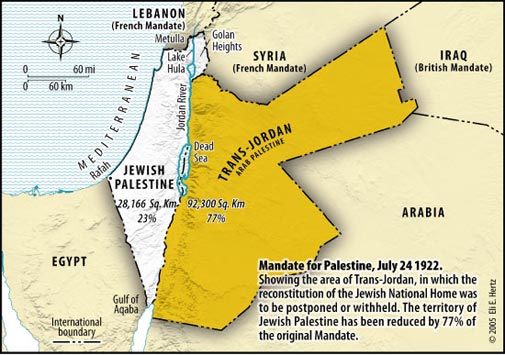[Published 25 January 2017]
President Trump’s meeting with UK Prime Minister Theresa May this coming Friday affords them a perfect opportunity to discuss reaffirming their countries commitments to the Jewish People made by America in 2004 and Great Britain in 1922 — which were seriously undermined when neither country vetoed Security Council Resolution 2334 on 23 December 2016.
America’s commitments were given in a letter from President George Bush to then Israeli Prime Minister Ariel Sharon dated 14 April 2004 to:
1. encourage Israel’s unilateral disengagement from Gaza and part of the West Bank andBush’s commitments included:
2. give the Bush-Quartet Roadmap (“Roadmap”) every chance of ending a conflict that had raged unresolved for about 85 years.
(i) Preventing any attempt by anyone to impose any plan other than the Roadmap.
(ii) Acknowledging that Israel must have secure and recognized borders, which should emerge from negotiations between Israel and the PLO in accordance with UNSC Resolutions 242 and 338.
(iii) Agreeing in light of new realities on the ground, including already existing major Israeli populations centers, that it was unrealistic to expect that the outcome of final status negotiations would be a full and complete return to the armistice lines of 1949.
These commitments were overwhelmingly endorsed by the Congress by 502 votes 12.
President Obama actively attempted to subvert these commitments during his eight years in office - culminating in Obama’s failure to veto Resolution 2334 in the dying days of his Presidency — which trashed the above commitments and made them meaningless.
Great Britain had pledged to the Jewish People in 1922 that the reconstitution of the Jewish National Home in Palestine would take place within 23% of the territory designated in the League of Nations Mandate for Palestine — today called Israel, East Jerusalem, Gaza and Judea and Samaria (West Bank) — whilst the remaining 77% would become an Arab homeland — today called Jordan.
This 23/77 division was embodied in Article 25 of the Mandate - after violent Arab riots in 1920-1921 accompanied by strident and strenuous Palestinian Arab political opposition to any idea of a Jewish National Home in Palestine had led to the British White Paper in June 1922 declaring that Arab apprehensions were partly based on exaggerated interpretations of the meaning of the Balfour Declaration.
The White Paper stated:
"Unauthorized statements have been made to the effect that the purpose in view [of the Balfour Declaration - ed] is to create a wholly Jewish Palestine. Phrases have been used such as that Palestine is to become “as Jewish as England is English.” His Majesty’s Government regard any such expectation as impracticable and have no such aim in view. Nor have they at any time contemplated, as appears to be feared by the Arab delegation, the disappearance or the subordination of the Arabic population, language, or culture in Palestine. They would draw attention to the fact that the terms of the Declaration referred to do not contemplate that Palestine as a whole should be converted into a Jewish National Home, but that such a Home should be founded ‘in Palestine'.”
Resolution 2334 has now declared as illegal the rights vested by the Mandate in the Jewish People to reconstitute the Jewish National Home in East Jerusalem, Gaza and Judea and Samaria (West Bank) - despite such rights having been preserved by article 80 of the United Nations Charter.
Vetoing Resolution 2334 would have averted America and the UK betraying their commitments to the Jewish People.
Reaffirming those commitments will do more to resolve the Jewish-Arab conflict than moving the American embassy to Jerusalem.
Commitments when made by States should never be shredded without mutual agreement.
